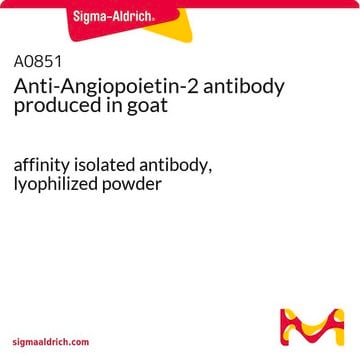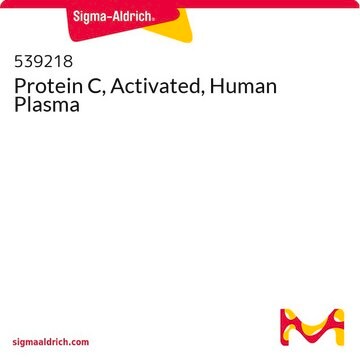A0604
Monoclonal Anti-Angiopoietin-1 antibody produced in mouse
clone 171718, purified immunoglobulin
Synonym(s):
Anti-ANG-1
About This Item
Recommended Products
biological source
mouse
Quality Level
conjugate
unconjugated
antibody form
purified immunoglobulin
antibody product type
primary antibodies
clone
171718, monoclonal
species reactivity
human
technique(s)
immunohistochemistry: 25 μg/mL using cells and tissue sections
indirect ELISA: 0.5-1.0 μg/mL
western blot: 1-2 μg/mL
isotype
IgG2b
UniProt accession no.
storage temp.
−20°C
target post-translational modification
unmodified
Gene Information
human ... ANGPT1(284)
General description
Immunogen
Application
Immunohistochemistry (1 paper)
Biochem/physiol Actions
Angiopoietins are growth factors vital for vascular differentiation during normal development. There are four angiopoietins discovered that bind to receptor tyrosine kinases Tie2. Angiopoietin-1 (ANG-1) is a potent pro-angiogenic factor that works by recruits mural cells for endothelial tubule formation and vessel maturation. ANG-1 acts along with VEGF in enhance angiogenesis and increase vascular branching. ANG-1 also affects the inflammatory process and inhibits the capillary transmigration of leukocytes on TNF-α stimulation. Sonic hedgehog, a secreted growth factor, reportedly upregulates the expression of ANG-1. Overexpression of angiopoietins has been observed in a variety of malignancies including neuroblastoma, glioblastoma and lung cancers. While ANG-2 increases the metastasis and angiogenesis of the tumors, ANG-1 inhibits tumor angiogenesis
Physical form
Disclaimer
Not finding the right product?
Try our Product Selector Tool.
recommended
Storage Class Code
11 - Combustible Solids
WGK
WGK 1
Flash Point(F)
Not applicable
Flash Point(C)
Not applicable
Personal Protective Equipment
Certificates of Analysis (COA)
Search for Certificates of Analysis (COA) by entering the products Lot/Batch Number. Lot and Batch Numbers can be found on a product’s label following the words ‘Lot’ or ‘Batch’.
Already Own This Product?
Find documentation for the products that you have recently purchased in the Document Library.
Our team of scientists has experience in all areas of research including Life Science, Material Science, Chemical Synthesis, Chromatography, Analytical and many others.
Contact Technical Service







